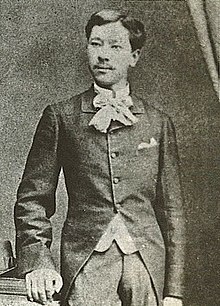
Back پيدرو پاتيرنو ARZ Pedro Paterno BCL Pedro Paterno German Pedro Paterno Esperanto Pedro Paterno Spanish Pedro Paterno Finnish Pedro Paterno French Pedro Paterno ID 페드로 파테르노 Korean Pedro Paterno Dutch
Pedro Alejandro Paterno | |
|---|---|
 | |
| 2nd Prime Minister of the Philippines | |
| In office May 8, 1899 – November 13, 1899 | |
| President | Emilio Aguinaldo |
| Deputy | Trinidad Pardo de Tavera |
| Preceded by | Apolinario Mabini |
| Succeeded by | Position abolished (Next held by Ferdinand Marcos) |
| President of the Malolos Congress | |
| In office September 15, 1898 – November 13, 1899 | |
| Vice President | Benito Legarda |
| Preceded by | Position established |
| Succeeded by | Position abolished (Sergio Osmeña as Speaker of the Philippine Assembly) |
| Member of the Philippine Assembly from La Laguna's 1st district | |
| In office October 16, 1907 – May 20, 1909 | |
| Preceded by | District established |
| Succeeded by | Potenciano Malvar |
| Member of the Malolos Congress from Ilocos Norte | |
| In office September 15, 1898 – November 13, 1899 | |
| Personal details | |
| Born | Pedro Alejandro Paterno y de Vera Ignacio February 27, 1857 Manila, Captaincy General of the Philippines, Spanish Empire |
| Died | April 26, 1911 (aged 54) Manila, Philippine Islands |
| Resting place | Manila North Cemetery |
| Political party | Nacionalista (1907–1911) |
| Other political affiliations | Federalista (1900–1907) Independent (1898–1900) |
| Spouse |
Luisa Pineyro y Merino
(m. 1890; died 1897) |
| Alma mater | Ateneo Municipal de Manila (BA) University of Salamanca Central Madrid University (DCL, JCD) |
| Occupation | Politician |
| Profession | Poet, novelist |
Pedro Alejandro Paterno y de Vera Ignacio[2][note 1] (February 27, 1857 – April 26, 1911[note 2][3]) was a Filipino politician infamous for being a turncoat. He was also a poet and a novelist.[4]
His intervention on behalf of the Spanish led to the signing of the Pact of Biak-na-Bato on December 14, 1897, an account of which he published in 1910. Among his other works include the first novel written by a native Filipino, Ninay (1885), and the first Filipino collection of poems in Spanish, Sampaguitas y otras poesías varias ("Jasmines and Other Various Poems"), published in Madrid in 1880.[5]
- ^ Gonzalez, Augusto Marcelino III (August 3, 2022). "Pedro Paterno's life is a picture of what it's like to be a super rich Pinoy during Rizal's time". ABS-CBN News. Retrieved February 11, 2023.
- ^ a b Cite error: The named reference
Revistawas invoked but never defined (see the help page). - ^ Tucker, Spencer C. (2009). The Encyclopedia of Spanish-American and Philippine-merican Wars: a political, social, and military history, Volume 1. Bloomsbury Academic. ISBN 9781851099511. Retrieved June 2, 2011., 993 pages
- ^ Mojares, Resil (2006). "Pedro Paterno". Brains of the Nation: Pedro Paterno, T.H. Pardo de Tavera, Isabelo de los Reyes, and the Production of Modern Knowledge. Quezon City: Ateneo de Manila University Press. pp. 1–118. ISBN 971-550-496-5.
- ^ Ocampo, Ambeth (December 4, 2005). "Looking Back: "Looking Back: The First Filipino Novel"". Philippine Daily Inquirer. Archived from the original on April 3, 2007.
Cite error: There are <ref group=note> tags on this page, but the references will not show without a {{reflist|group=note}} template (see the help page).
© MMXXIII Rich X Search. We shall prevail. All rights reserved. Rich X Search